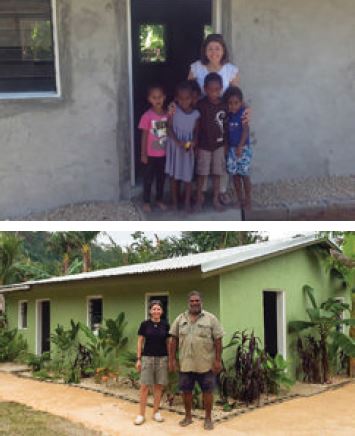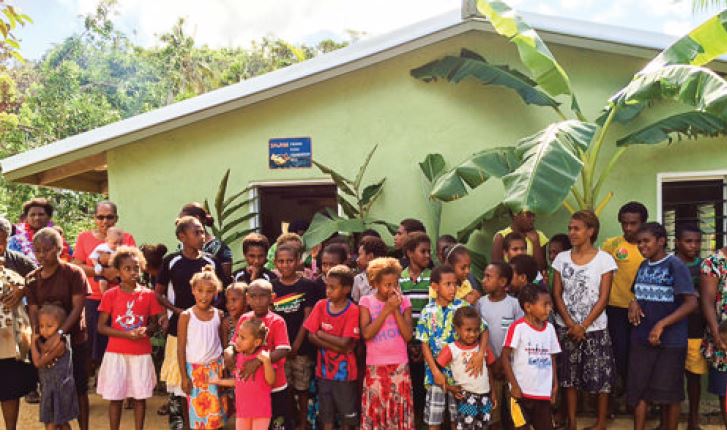Upon hearing the tragedy, Helen Collier-Kogtevs, a successful property investor and managing director of Real Wealth Australia, knew she had do to something to help.
Having had a long connection with Vanuatu over the past 10 years and knowing a lot of people there, she vowed to help them rebuild in any way she could.
“All we heard was how massive it was – a super category 5, the strongest type of cyclone you can get – and because we know how underdeveloped and poor this country is, we knew this cyclone would be devastating. We weren’t sure if our friends over there had survived so as soon as it was possible, my husband Ed jumped on a plane to see how and where we could help,” she recalls.
Helen soon joined Ed, bringing food, a chainsaw and 90kg of tarpaulins in her luggage. For several days, she admits that she struggled to process the enormous scale of devastation to Vanuatu.
“Flying in, it just looked like it had been stripped back. There was no greenery; in its place was brown and black earth. It was really very eerie,” she recalls.
“There was no clean water, which was a huge problem, and no food. So our contribution initially was to start buying food. We would literally fill up the ute and then give rice and tinned food to anyone we could. A lot of ex-pats over there were doing the same thing.”

“At one point, I was introduced to the teacher of a kindergarten, whose classroom no longer had a roof. I’m all about education, so Ed and I made the decision to start rebuilding the kindergarten ourselves by buying bricks, timber and other materials, and pay one of the local builders to start building it. But then we met others who shared our vision, and together we decided to make this all happen.” Stephanie Nielson, an ex-pat from New Zealand who had lived in Vanuatu for 10 years, Robin Culph, an Australian, and Marg Manhire all came on board to help rebuild the Mele Maat village kindergarten.
Construction of the building was completed in mid-July and has allowed 30-plus children to get back on track with their daily education and play routines.
The women have since established the SHaRM Pikinini Ecole Foundation (SHaRMfoundation.com) to formalise their commitment. Ecole is French for school, while Pikinini is Bislama – Vanuatu’s national language – for children. SHaRM stands for the charity’s founders, Stephanie, Helen, and Robin, Marg. Since setting this up, they committed to another 25 projects in the pipeline.
Their second project, Suango Ecole Primary School has 365 students still all studying under UNICEF tents. The third project is re-roofing Manua Primary School which had its roofs all blown off in the cyclone.
“Charity work was always part of the grand plan of things,” says Helen. “I knew at some point I would want to give back on a larger scale. So during the early days of investing, I stopped contributing to charities eg. $5 here or $20 there, as the intention was to build the portfolio first (or build the wealth) and to then later be able to donate more and more often, and on a larger scale.
“Having wealth is one thing, but it’s what you do with it that counts and for me, helping others to help themselves makes for a better world for all. At the end of the day, having money is just having money, but real joy comes when you share your wealth with others, whether that be your family, your friends or complete strangers.”
